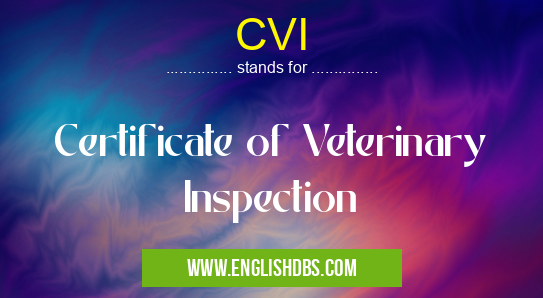What does CVI mean in VETERINARY
A Certificate of Veterinary Inspection (CVI) is a document used to certify that an animal has been examined by a licensed veterinarian and found to be healthy or free from any contagious, infectious, or communicable diseases. This certificate is typically issued prior to the transportation of animals across state lines. It can also be used to show proof of health in order to register animals for shows and competitions. CVIs provide an important assurance that animal health requirements have been met prior to the movement of livestock across state borders.

CVI meaning in Veterinary in Medical
CVI mostly used in an acronym Veterinary in Category Medical that means Certificate of Veterinary Inspection
Shorthand: CVI,
Full Form: Certificate of Veterinary Inspection
For more information of "Certificate of Veterinary Inspection", see the section below.
» Medical » Veterinary
What CVI Means
CVI stands for Certificate of Veterinary Inspection. A CVI is usually completed by a qualified veterinarian in order to certify that an animal has been thoroughly examined and is free from any communicable diseases before being transported across state lines. The CVI will contain information about the animal such as its species, breed, age, color, sex, microchip ID number, vaccination history, and physical description. It will also include details on external parasites detected during the examination. All relevant information must be included in the CVI before it can be submitted and approved for transport purposes.
Benefits of CVI
CVIs are important documents because they provide assurance that all necessary inspections have been performed and the animal is healthy prior to movement across state lines. Without a valid CVI, state authorities may not allow the transporting of an animal into their jurisdiction. The use of a CVI can help prevent the spread of potentially dangerous diseases from one region to another by ensuring that animals are properly examined on both sides of their journey. Additionally, many show and competition registrations require evidence of veterinary inspection before they can accept entry forms from participants; having a current CVI handy helps save time in these situations as well.
Essential Questions and Answers on Certificate of Veterinary Inspection in "MEDICAL»VET"
What is a Certificate of Veterinary Inspection (CVI)?
A Certificate of Veterinary Inspection (CVI) is an official document issued by a licensed veterinarian that states required health tests have been conducted on animals and that the animal is free from disease.
What types of animals require a CVI?
Animals that are being transported across state lines, internationally, or to a fair or exhibition will usually require a CVI. This generally includes large animals such as horses, cattle, hogs, goats, sheep and poultry. Some states may also require a CVI for rodents and exotic pets such as ferrets, lizards or snakes.
How do I get a CVI?
You'll need to contact your state's Department of Agriculture Office in order to determine if you need a CVI. After confirming your state's requirements, you should locate and contact a licensed veterinarian who can conduct the necessary health tests and fill out the CVI paperwork.
Are there any fees associated with obtaining a CVI?
Yes, there will likely be costs associated with obtaining a CVI from your vet including charges for testing and paperwork fees as well as any other medical treatments needed in order to meet the health requirements for transport.
Is there an expiration date on CVIs?
Generally speaking, CVIs are only valid for 30 days unless stated otherwise by your state’s Department of Agriculture Office. If transporting an animal across state lines, it’s best to consult with both states involved in order to ensure the validity of the certificate at destination.
What happens if I don't have an up-to-date CVI when transporting an animal?
Without an up-to-date certificate of veterinary inspection prior to transport you may be subject to fines or penalties imposed by the relevant regulatory authorities in each jurisdiction. It is also illegal in many countries since customs officials need proof that all necessary health tests have been conducted prior to transport.
Are certain diseases excluded from CVIs?
Yes, some diseases are excluded from certificates depending on where you’re travelling too – such as those requiring special permits. It is important to check with both exporting and importing countries for their specific conditions prior to transport in order for the animal’s travel documents to remain valid throughout the journey.
Final Words:
In conclusion, CVIs serve an essential purpose when it comes to regulating interstate commerce between states with regards to livestock transportations and show registration requirements. They help prevent disease transmission while providing key assurances that animals have been inspected for signs of illness or infestation prior to entering other territories or participating in competitions or events involving live animals. A valid Certificate of Veterinary Inspection must contain all required information regarding the health status of the animal in question before it can be accepted by authorities or other institutions involved in livestock management activities.
CVI also stands for: |
|
| All stands for CVI |
